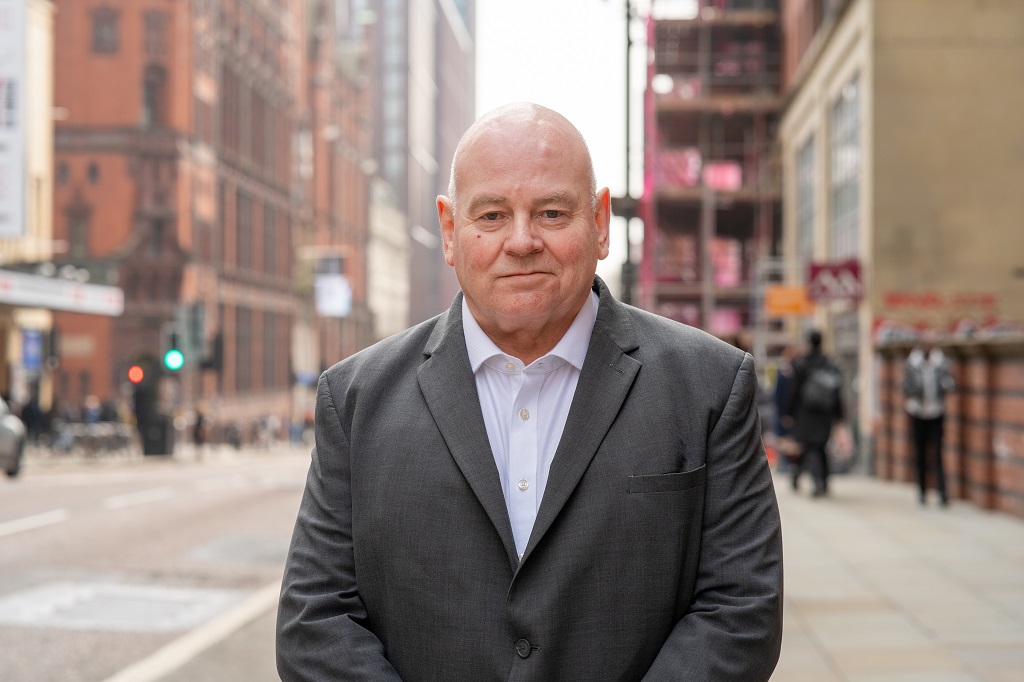Q&A | Eamonn Boylan reflects on 42 years in public service
Before dusting off his golf clubs, the outgoing chief executive of the Greater Manchester Combined Authority sat down with Place North West deputy editor Dan Whelan to reflect on the seismic role he has played in the growth of the city region.
He was instrumental in the regeneration of Hulme in his early days at Manchester City Council, helped bring the city region’s buses back under public control, and led Greater Manchester’s response to the Covid pandemic.
Looking back on a 42-year career that began in the Miles Platting housing office and ended with him as arguably the most powerful civil servant outside Whitehall, he talked about the people who shaped his leadership style and why he was never tempted by the lure of the private sector.
“You don’t get into public service to get rich,” Eamonn Boylan said as he prepares to hands over the reins to Caroline Simpson.
Boylan might not be a millionaire but he is satisfied with what he has achieved as he leaves the office for the last time on Friday.
Below are highlights from our chat with Boylan. For extra insight into his career and more thoughts from the man himself, listen to the podcast. As a note, some of Boylan’s answers have been edited for brevity and clarity.
DW: You arrived here from Hartlepool for university in the late 1970s and you are still here, why?
EB: Sir Howard Bernstein says I have had two loan periods to Bob Kerslake, one to the Homes England as deputy CEO between 2008 and 2010] and one to Sheffield City Council [as director of housing between 1997 and 1999]. But I came back because GM is not a place, it is the place for me.
It’s given me all the opportunities I’ve ever had. I met my partner here, we had our kids here. I’m not pretending it’s perfect, I’m not pretending it’s beautiful. But it’s a great place.
I arrived here from Hartlepool in the North East, which is a pretty deprived post-industrial town, and I thought, this is just like Hartlepool but it’s dirtier, bigger, and there’s no sea.
Looking at it now, it’s gone from being a big provincial town to being a European city of real prominence. That’s not just about the big buildings, that’s about the economic activity, it’s about the profile of the place, the reputation of the place, and the culture of the place.
Being able to have been a big part of that and to play a small supporting role in things like the Commonwealth Games and the Manchester International Festival, you don’t get those opportunities in many places on earth to be honest.
You have a lot to be proud of, tell me about some of your career highlights.
In terms of achievements during the course of my career, one thing that really stands out is the regeneration of Hulme, which was an enormous undertaking and not without controversy.
Editor’s note – The Hulme project, which began in the early 1990s, comprised the regeneration of more than 200 acres of inner city land in a bid to improve the poor quality of the built environment and address various social issues.
We set out an ambition to try and create a place where people can make a logical decision to live, to grow up, to learn, to start a business. And I think that’s what we’ve done to a degree.
It is by no means perfect, but it’s an example of integrated joined-up urban regeneration. I think it stood the test of time.
The other thing that I would say has been a career highlight is what we’re doing now with [taking public control of] the buses. We’ve led the way. The whole nation stood back waiting for us to fail and we haven’t.

Boylan said people wanted GM to fail in its bid to take buses under public control. Credit: via TfGM
What about the trailblazer devolution deal?
That changes the game. A lot of the devolution deals that we did in the last decade have given us degrees of power and influence, but a lot of the time it’s been effectively a matter of delegating authority for the management of national programmes.
This time round, we get responsibility for functions, not budgets.
We will sign up for a set of outcomes around housing, adult skills, transport, decarbonisation, and retrofit. Government will then, we hope, say to us ‘there’s a pot of money over there, those are the things you said you’re going to do, get on and do them’.
What have been the most challenging parts of your career?
I joined the National Housing Agency [now Homes England] at the point at which the backside fell out of the housing market in 2008.
That was an interesting experience [as deputy chief executive], to say the least. We were rushing around the country, pumping money into schemes just to try and keep the building industry alive.
I also rejoined local government [as Stockport Council chief executive in 2010] at the point at which the David Cameron government was elected, and the George Osborne period of austerity started. So there were a number of years where it just felt like it was getting tougher and tougher and tougher to manage the budget that was being dealt.
Who have been the most influential people during your career?
In terms of professional colleagues, Sir Howard Bernstein. He nurtured me and I’ve learned from him.
He brought me from the job I was doing [in the Miles Platting housing office] in North Manchester and put me into the Hulme project fairly early on.
It was quite a big vote of confidence because it was the big flagship project that we were trying to do with time.
He taught me the Greater Manchester way, which is don’t run around worrying about the money. Just determine what it is that’s important and then find a way of getting there.
That’s always been the approach that I’ve tried to take as a result of working with Howard. He is utterly tireless, utterly relentless, but also compassionate.
Everyone thinks about Howard as a private sector developer dressed up as a public servant. He’s not. He was a public servant who knew the power of private investment to help deliver the outcomes that he wanted for his city.
You spent seven years from 2010 to 2017 as chief executive of Stockport Council, how do you reflect on how far the borough has come in recent years?
I think it was very much a team effort. And I think the progress that has been made over the last 10 years has been really fantastic.
[The council] had become detached from the economic decline of the town centre. So it took quite a while to get a bit of momentum going but we got all-party support and they all signed up to a vision for us trying to get economic growth back into the town centre.
That is why we started where we did with Stockport Exchange [an office development next to the train station] and the commercial Grade A floorspace there.
I looked at the station and thought you’re less than two hours from London, you are 15 minutes from Manchester, you 20 minutes from the airport. Why is there no good quality office accommodation here? It’s got to be a no-brainer.
It was quite a task to get it going but, when we did, it hit the ground and the market well, and then that momentum developed beyond that.
Can the success of Stockport be emulated in other GM towns?
Stockport is strong in terms of connectivity and so are a number of other places, and they’re starting to realise the potential of that.
We’ve now got much more ambitious plans for town centres in places like Rochdale, Oldham, Ashton, and Stretford, all coming through at various speeds. And that’s necessary because different market conditions dictate what you can achieve and within what timescale. But I think the ambition has grown through the last seven or eight years.
We’re now seeing much more realistic ambition in places that I think will start to deliver quite significant change.
Those towns are developing their own strategies for their own success. And they need to do that because there isn’t a blueprint that you can just lift and shift. Some of what worked in Stockport will work in other places, but not everything will.
We just need to be very, very careful that we’ve got a proper place focus on what it is that we’re trying to do.
You became GMCA chief executive in 2017 and have worked closely with GM Mayor Andy Burnham ever since, how do you reflect on that relationship?
I can say unreservedly that it has been great working with Andy. We had a sense of nervousness about it because we didn’t know how a mayoral system would really work. Getting a mayor with the profile of Andy and the dynamism and the energy and the drive caused a few ripples to say the least.
You have dedicated your career to public service, did the private sector ever appeal to you?
I have never been tempted to move across because I’ve always taken pride in the fact that I’ve believed that the job I was doing was potentially, if not actually, delivering improvement and change for places and people.
You don’t go into local government to get rich I can assure you that. But it is uniquely rewarding if what you can do is get your head around the importance and the primacy of that relationship with place.
How do you think you will be remembered?
I’d like to think that they will remember me for a leadership style that isn’t standing out in front and pointing at things.
It’s about encouraging people to coalesce around shared objectives. I’d like to think that people will think of me as someone who nurtured organisations and people.







A great leader who has contributed massively to GM.
By NEM lad
An inspirational read for a Friday morning.
By Anonymous
top man, great legacy
By Anonymous
Calm determined leader who is very inclusive and welcoming when you are finding your way
I hope he has a healthy and happy retirement 👍👏
By Anonymous